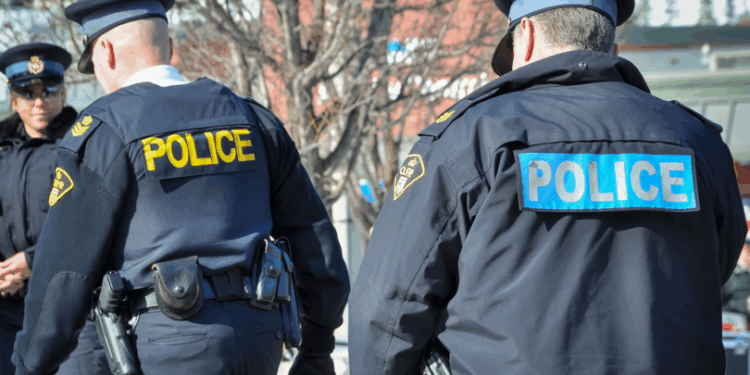(LifeSiteNews) — The Niagara Regional Police is facing a Human Rights Tribunal complaint from a transgender-identifying man who is angry that an officer asked for his original male name in order to identify him. He is (predictably) asking to be awarded financial compensation of $30,000 and re-education for the police.
The trans-identifying man now goes by the name Sabrina Hill. He was filming a web video at the St. Catharines bus terminal on December 17, 2023, when the police approached. Constable Ashley Del Duca asked him: “What’s your deadname?” A “deadname” is what many trans activists call their given name at birth, or the name they discarded in favor of one they feel better represents their chosen identity.
This, of course, makes it difficult when discerning a person’s identity – because records will refer to them as a different person. Trans activists have insisted that using a “deadname” is a form of actual violence. In their battle to force society to conform to their individual and collective identity claims, the very purpose of IDs – identification – has been undermined. Trans activists want it to be merely an expression of their current identity.
READ: Trump mocks ‘woke’ transgender ideology in meeting with Mark Carney
The police now must navigate perilous situations in which they are dealing with a trans-identifying person but must respect that person’s personal identity claims while also attempting to discern real facts.
“I’m sorry – what is my what?” Hill responded to Del Duca.
“Your deadname,” the officer asked again. Hill then asks what a “deadname” is, and Del Duca tells him “I’m just trying to be respectful to you” and asks for Hill’s pronouns to discern what gender he identifies as. Hill told the CBC that he doesn’t trust the police, and didn’t feel that he needed to provide the requested information to the police.
“A deadname isn’t just an old name – it’s tied to misgendering intentionally, discrimination and really an erasure of who I am,” Hill told the CBC. “She wasn’t concerned with who I am. She wanted to embarrass me and know who I was despite having no legal, ethical or moral right to do so.”
Hill, of course, is projecting – the officer, like everybody else, seems to have been trying to navigate the cultural chaos created by the top-down implementation of gender ideology across society. The rules keep on changing, and it can be hard to keep up. The Niagara Regional Police Service and Officer Ashley Del Duca have both filed a response to the Human Rights Tribunal.
Human Rights Tribunals, as CBC noted, “adjudicates claims under Ontario’s Human Rights Code, which protects people from discrimination and harassment based on gender expression and gender identity.” HRTs have regularly ruled in favor of trans activists asking for exorbitant amounts of money for nonsensical discrimination claims. Even so, Hill, who filed his complaint on January 15, also told the CBC that the tribunal is “fundamentally rigged.”
“While the police officer who harmed me has secured [an] attorney billing over $500 an hour, I have had to represent myself,” Hill told the CBC. “This isn’t a David and Goliath situation. I am a piece of gravel in David’s shoe.”
Remember: all the police officer did was request Hill’s original name. She is now being accused of “harm” as a result. Hill claims 30 legal organizations rejected his calls for help, but only an LGBT community centre in Toronto, The 519, was willing to give him a phone consultation. According to the CBC:
Johanna Macdonald, director of legal initiatives at The 519, said unrepresented complainants like Hill have an uphill battle when faced with legal arguments from an experienced lawyer and that more government support to access legal help is needed.
The term “deadname” can be “extremely triggering” for transgender people, Colleen Elizabeth McTeague, a transgender woman and facilitator for the peer support group Transgender Niagara, told CBC Hamilton in a previous interview. “I would feel attacked if somebody asked me that and I would definitely refuse to provide that.”
READ: Detransitioners face neglect, inadequate support from medical industry, friends: study
Of course, nobody bothered to explain what the police are supposed to do when a person of interest has changed their identity – but since the LGBT movement states that words are violence, they don’t have to. They merely have to claim that it made them feel “attacked,” and their fellow activists will consider this evidence enough.
Indeed, the police response to the HRT – the case goes to mediation on October 15 – was positively plaintive. “She considered that term to be common and relatable terminology within the transgendered community,” says the response document, which asks for the tribunal to dismiss the case. “Const. Del Duca had no intention of calling the applicant by her deadname. She needed it to conduct the necessary inquiries in the course of her investigation.”
Hill apparently expressed resentment to the police about dealing with “idiot police officers” and additionally referred to Del Duca as a “Smarmy Barbie,” “Transphobic Karen Cop,” and a “Hobbit” in social media posts. The police stated that Hill “couldn’t have been humiliated or victimized because she posted about the incident online numerous times.” The police also stated that their LGBT training is more than sufficient.
Hill, however, is seeking $30,000 for “humiliation and the experience of victimization” with an additional $546 for “lost wages.” LGBT activists are standing with him. “You’ve been violated, therefore taking any sort of legal action is very challenging,” Joanna Macdonald told the CBC. “You’re having to be proactive and engaging in a system which historically is challenging to navigate, and may face further barriers and re-traumatization.”
It takes an extraordinary lack of awareness, an acute martyr complex, and an enormous sense of entitlement to claim that a system that has been fundamentally rigged in favor of LGBT claims over the past two decades is in fact a tool of “re-traumatization,” but welcome to Canada in 2025.


















